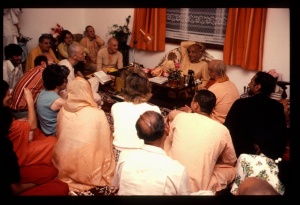SB 9.2.15

A.C. Bhaktivedanta Swami Prabhupada
TEXT 15
- kaviḥ kanīyān viṣayeṣu niḥspṛho
- visṛjya rājyaṁ saha bandhubhir vanam
- niveśya citte puruṣaṁ sva-rociṣaṁ
- viveśa kaiśora-vayāḥ paraṁ gataḥ
SYNONYMS
kaviḥ — another son, known as Kavi; kanīyān — who was the youngest; viṣayeṣu — in material enjoyments; niḥspṛhaḥ — being without attachment; visṛjya — after giving up; rājyam — his father's property, the kingdom; saha bandhubhiḥ — accompanied by friends; vanam — the forest; niveśya — keeping always; citte — within the core of the heart; puruṣam — the Supreme Person; sva-rociṣam — self-effulgent; viveśa — entered; kaiśora-vayāḥ — a young man not fully in youth; param — the transcendental world; gataḥ — entered.
TRANSLATION
Being reluctant to accept material enjoyment, Manu's youngest son, whose name was Kavi, gave up the kingdom before attaining full youth. Accompanied by his friends, he went to the forest, always thinking of the self-effulgent Supreme Personality of Godhead within the core of his heart. Thus he attained perfection.